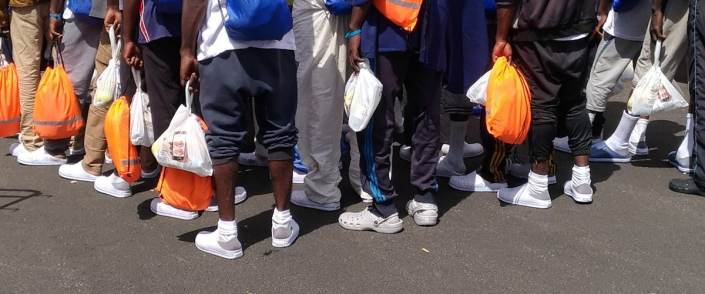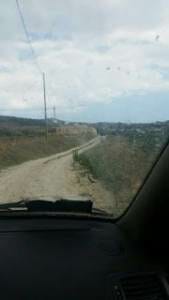Visit to the Camp at Pian del Lago
In January we visited the camp at Pian del Lago, in Caltanissetta, twice, along with staff from Oxfam as part of the OpenEurope project. The eviction of the encampment a few days before Christmas filled the pages of the daily newspapers, but had no effect at all on the migrants’ lives: they were living on the street before, and they lived on the street immediately afterwards. As soon as the police had left the sit, in fact, a dozen people moved in under the motorway columns, rebuilding their makeshift homes our of beat up tents and plastic boxes and sheets, the only means they have to deal with one of the coldest winters in years.
There is no institution, other than at the moment of the evictions themselves, which is engaged with helping the migrants, and it is only thanks to the solidarity of the residents at the nearby centre for asylum seekers (CARA*) and groups of volunteers that they manage to survive without food, water, hygiene provisions and general assistance. The camp which they have built recalls so many other encampments spread throughout Italy and Europe, where the risk of tensions between those living there is raised by the unstable conditions of life, and where tragedies – like that at Sesto Fiorentino, in Tuscany – hide behind every corner.
The first day we visited there were around 30 people present, even if it is likely that there were many more “residents” in the camp. Many of them were Pakistani, as well as some Bangladeshis and a few Africans. Each of them had his own personal history and there were a wide range of reasons for which they found themselves there, only 500m from the detention centre (CIE*) and centre for asylum seekers in Caltanissetta. The Pakistanis, like the Bangladeshis, had made their way to Pian del Lago after an endless and extremely difficult journey via the Balkan route, attracted by the alleged speed of the police station there. (The immigration office is in the local government building itself). What they found, however, was the police station’s waiting list, an entirely informal piece of paper which sooner or later provides the possibility to formalise the request for international protection and, perhaps, a place in the centre for asylum seekers. This is an entirely unlawful practice, not only because it delays admission into the reception system for months, but also because it does not count as an expression of the request for asylum, meaning that people remain without documents up till the appointment itself. During this period time, which can last months, asylum seekers wait it out amassed in the camp, without documents or any kind of assistance.
We then met four young Ivorian men, some of whom said they were minors despite having been identified as adults, who told us their stories, stories which would be incredible if it were not for their reality and diffusion, as well as shining some light on the slackness and practices they live through as far as the procedures for international protection are concerned. This young men were part of a group of 41 Ivorians who landed on November 16th in Catania, each of them then being treated differently – apparently without reason – and, at least for seven of them, without having any information relating to their rights, or having their personal stories heard. According to their own account, ten of them immediately expressed the desire to claim asylum, and thus were taken to the centre for asylum seekers (CARA*), while the others were given expulsion notices and immediately taken to the detention centre (CIE*). After 30 days the Justice of the Peace confirmed the extension of their detention for another month, but 12 of them were nevertheless let out on December 27th, well before the deadline, because the Ministry of the Interior needed to free up spaces for new migrants to be locked up.
According to their account, once outside of the detention centre, five of them have had their request for asylum formalised and have been inserted into the centre (CARA*), and four moved to the informal camp, while the others preferred to leave Caltanissetta for good. This last group have had difficulty following the process and thus find themselves in Italy without documents, without knowing what awaits them. The other 19, on the other hand, remain in the detention centre, awaiting the end of the period of their detention.
On our second visit we learnt that the four Ivorian men who we had met had subsequently been accepted to the centre, having presented their asylum request and the appeal against the rejection notice. We then met other people who, despite having appealed against the negative response to their request for protection, were by now excluded from the reception system. This situation has been borne out of illegal practices enacted by some police stations, given that an asylum seeker has the right to housing in the reception system right up until the response to the appeal.
There are then a range of people in the camp who have received international protection but, despite having leave to remain, are sleeping rough. In fact, after an endless wait for documents, often spent in structures which have no relevant projects, they end their period in the reception system without any prospects of social inclusion.
Another serious and illegal activity enacted by many police stations s that of asking an official residence document in order to renew the leave to remain of those who have received international protection. In Caltanissetta this has simply provided the opportunity for many people, Italian and otherwise, to profit from migrants by selling fictitious residence documents at a high price. This situation, which is nothing less than speculating on migrants, could be stopped if the local administration simply restored the use of the so-called ‘virtual residence’ for those with no fixed abode.
Our visit to Pian del Lago formed a clear picture of the reality of the reception and asylum systems in Italy. It is a reality composed of illegal practices, of minors treated like adults, of people rejected for no apparent reason, and without anyone providing information regarding their rights. It is the reality of a reception system based more on arithmetic calculations than on the real needs of the beneficiaries, and one of migrants abandoned in the country simply to end up joining the mass of irregularity and exploitation. A factory for the production of invisibility which does not so much seem to be working by accident, but with a clear institutional and political strategy.
Nicolas Luizzi
Borderline Sicilia
Project “OpenEurope” – Oxfam Italia, Diaconia Valdese, Borderline Sicilia Onlus
*CIE = Centro di Identification e Espulsione (Identification and Expulsion Centre)
*CARA = Centro di Accoglienza per Richiedenti Asilo (Reception Centre for Asylum Seekers)
Translation by Richard Braude


